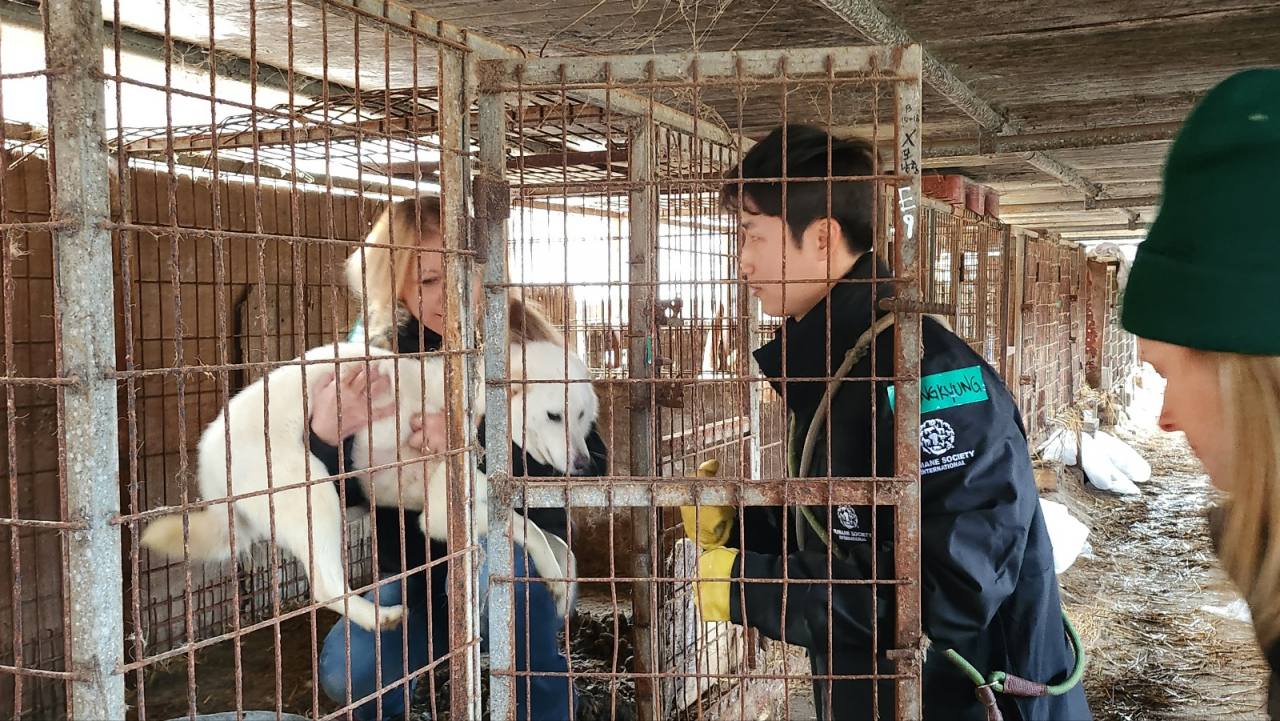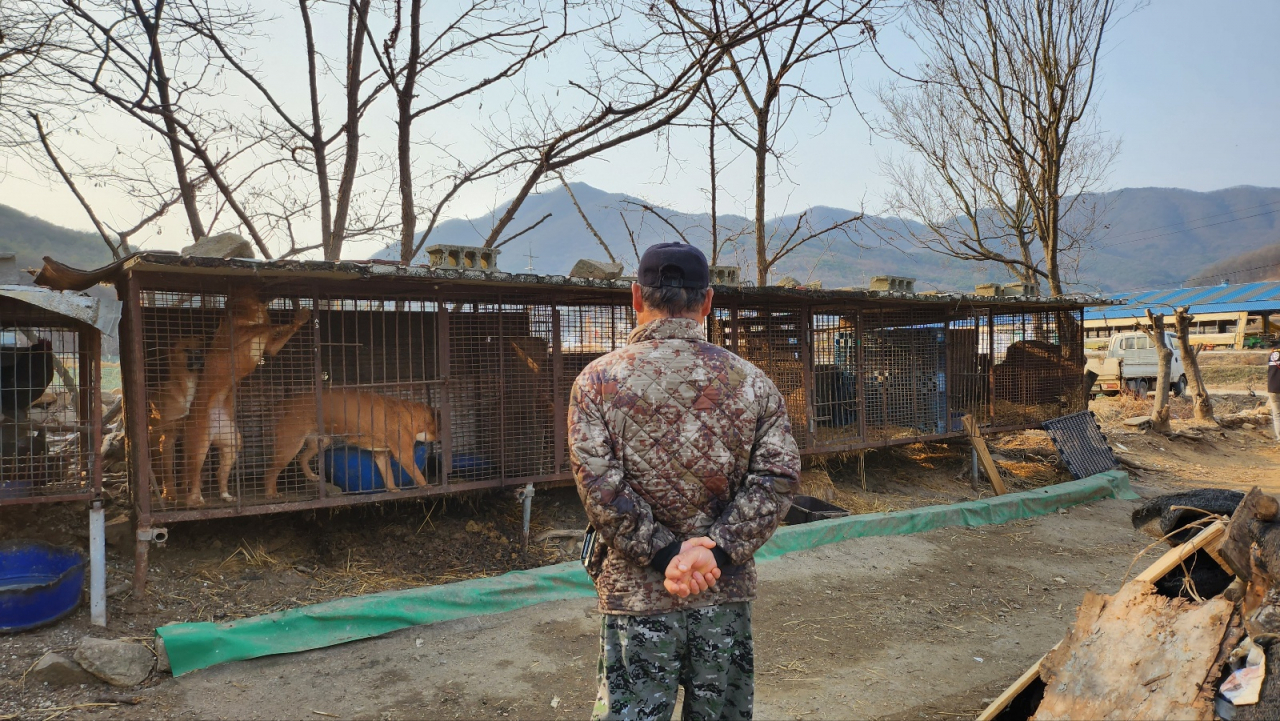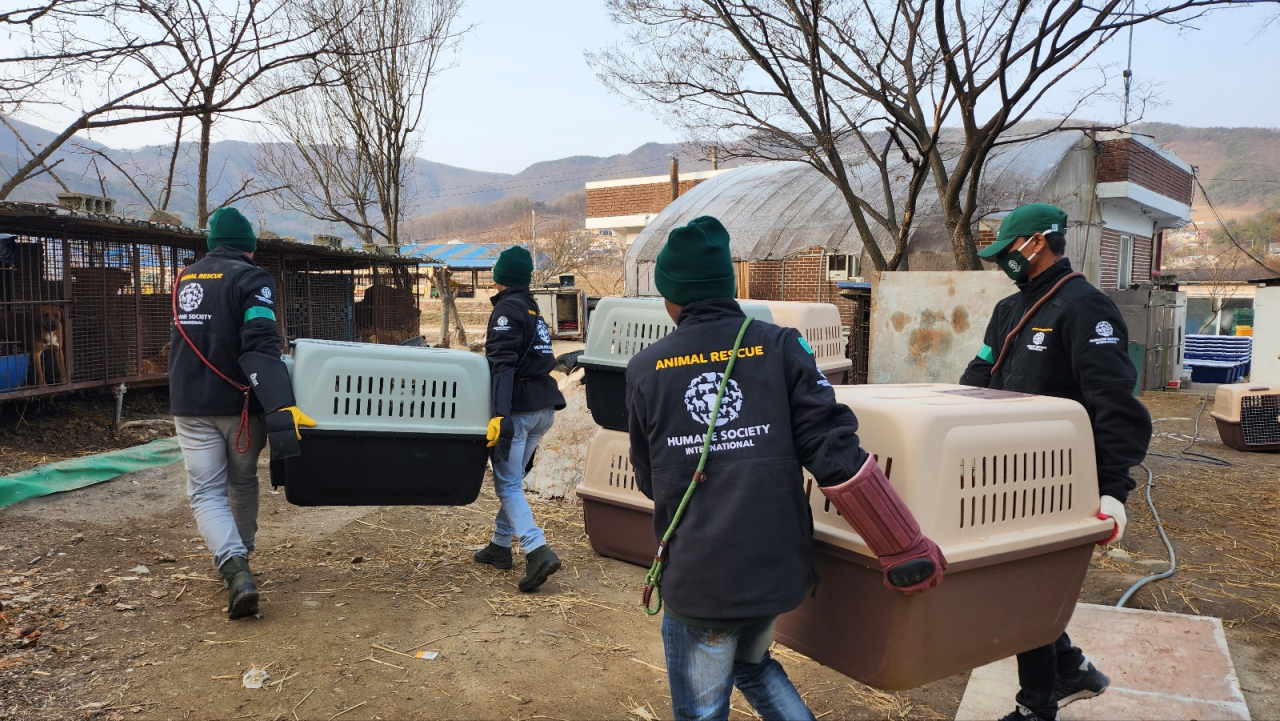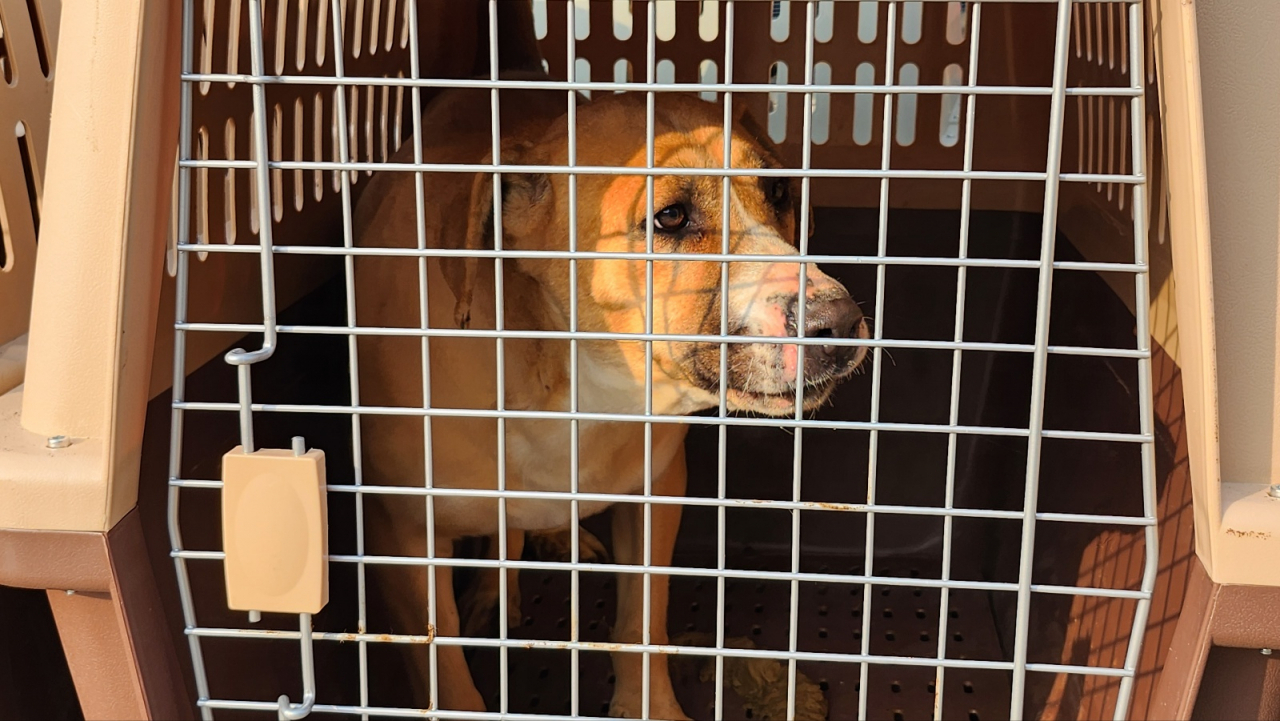[Newsmaker] [From the Scene] From meat to companion: 200 pups freed from dog farm in Asan
By Lee Jung-younPublished : March 8, 2023 - 15:23

ASAN, South Chungcheong Province – A serene countryside village in Asan, located in central South Chungcheong Province, was filled with hysterical barking and sometimes whining as rescuers entered a dog meat farm on Wednesday.
With fear and anxiety in their eyes, the dogs on the farm -- most of whom had never experienced meaningful interactions with humans -- seemed confused. Rescuers carefully went into narrow, dirty cages and moved the dogs into mobile kennels one by one.
"It's because they're not used to people, but they're actually very willing to interact," said Lee Sang-kyung, the campaign manager of Humane Society International, an international animal protection organization which has been rescuing animals from various businesses that involve animal abuse.
The dog meat farm in Asan, which had almost 200 dogs, is the 18th dog meat farm to have signed a contract to join the HIS’ Models for Change program. Launched in 2015, the program not only rescues dogs from unhealthy environments, but also provides farm owners with alternative ways to make a living.

The Asan dog meat farm owner is a 73-year-old surnamed Yang. He has been in the dog meat industry for 30 years, providing dogs to butchers and dog meat restaurants. Like many dog meat farm owners that HSI has worked with, Yang observed that the industry is gradually dying.
“I cannot say that I’ve made lots of money through this business, but I earned just enough to make a living,” he said. “But now it’s common sense to say there’ll be no future for this industry.”
Yang said that criticism against the dog meat industry has intensified since the 1988 Seoul Olympics, as many foreign countries became aware of dog meat consumption in Korea. “During the last 30 years, I received several complaints, and many animal rights groups visited my farm. Since this is how I make my living, I even legally registered my farm. But this kind of business seems no longer possible.”

HSI had been in communication with Yang since November last year. He finally signed a contract which legally binds him not to engage in any kind of business involving animals for 20 years.
All the dogs will be sent to HSI’s rescue and rehabilitation centers in the United States and Canada before moving to partner shelters there to look for families. The dogs were born and raised in Korea, but not many Korean families look for dogs from such farms.
“Many Koreans still consider a dog’s breed as its key value, and people have prejudices against dogs from dog meat farms,” said Seo Borami, the director of government affairs at HSI.
After the contract was signed, HSI had a hard time persuading Yang to provide a reasonable environment for his dogs, such as appropriate food instead of leftovers from nearby restaurants. However, Yang’s attitude toward dogs changed slowly.
"When I asked him to put hay in the cages to prevent cold, as dogs have to stay there over the winter before leaving the country and go through several processes like vaccinations, Yang objected, saying it would only make a mess. But when I saw him a few days later, he was putting hay in cages even though I didn't ask him to," said Seo.
Once HSI takes all the dogs and takes down the cages, Yang will grow crops and vegetables on the land that once confined hundreds of dogs with the organization’s help. Other than agriculture, dog meat farmers can try engaging in various alternative businesses. “One dog meat farmer began a water tank truck rental business, and now he owns about 10 trucks,” said Lee of HSI.

The dog meat farm in Asan is the first legally registered one among 18 others that the HSI has worked with so far. Korea still has thousands of dog meat farms nationwide, the organization estimates.
Most of the country’s dog meat farms are illegal and unregistered, so the government cannot collect any official data, said Wendy Higgins, director of international media at HIS.
However, the overall industry is changing, Higgins said, citing the Asan case. “Even a farmer who has legally registered his or her business, who has nothing to fear from the authorities, is determined to leave the dog meat industry,” she said.
The government formed a dog meat task force in December 2021, but there has not been any meaningful change, HIS’ Seo said, adding that the South Korean government should step up more to push for significant improvements to the situation.
“Our ultimate goal is to draw out meaningful participation of the government, as it is impossible for us to shut down all the dog meat farms in the country,” she said.


![[AtoZ into Korean mind] Humor in Korea: Navigating the line between what's funny and not](http://res.heraldm.com/phpwas/restmb_idxmake.php?idx=644&simg=/content/image/2024/04/22/20240422050642_0.jpg&u=)
![[Exclusive] Korean military set to ban iPhones over 'security' concerns](http://res.heraldm.com/phpwas/restmb_idxmake.php?idx=644&simg=/content/image/2024/04/23/20240423050599_0.jpg&u=20240423183955)


![[Herald Interview] Why Toss invited hackers to penetrate its system](http://res.heraldm.com/phpwas/restmb_idxmake.php?idx=644&simg=/content/image/2024/04/22/20240422050569_0.jpg&u=20240422150649)
![[Graphic News] 77% of young Koreans still financially dependent](http://res.heraldm.com/phpwas/restmb_idxmake.php?idx=644&simg=/content/image/2024/04/22/20240422050762_0.gif&u=)







![[Exclusive] Korean military to ban iPhones over security issues](http://res.heraldm.com/phpwas/restmb_idxmake.php?idx=652&simg=/content/image/2024/04/23/20240423050599_0.jpg&u=20240423183955)



![[Today’s K-pop] Ateez confirms US tour details](http://res.heraldm.com/phpwas/restmb_idxmake.php?idx=642&simg=/content/image/2024/04/23/20240423050700_0.jpg&u=)